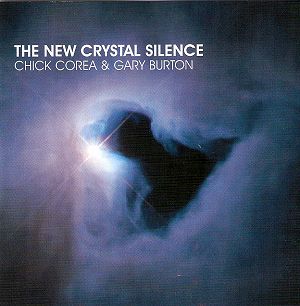CD1
1. Duende
2. Love Castle
3. Brasilia
4. Crystal Silence
5. La Fiesta
CD2
1. Bud Powell
2. Waltz for Debby
3. Alegria
4. No Mystery
5. Senor Mouse
6. Sweet and Lovely
7. I Loves You, Porgy
8. La Fiesta
Chick Corea - Piano
Gary Burton - Vibes
Sydney Symphony conducted by Jonathan Stockhammer
(on CD1)
Recently,
when I reviewed an album by Howard Alden and
Ken Peplowski, I commented on the particular
quality of the jazz duet - a form which necessitates
close attention from both the musicians involved.
This is particularly true of the duets which
Chick Corea and Gary Burton have been playing
together since 1971. Their two "keyboard"
instruments are in danger of smothering or
clashing with one another, but they skilfully
avoid this. Corea and Burton listen and react
to one another constantly, as you can hear
in the duets on the second CD of this double
album. On the opening tune, Chick Corea's
composition Bud Powell, they listen
intently to each other - blending together
in harmony, reacting telepathically and throwing
ideas back and forth. They are equally matched
in technical ability and impeccable virtuosity,
so this is a meeting of equals, although Chick
occasionally tends to dominate his colleague.
This
double album is called The New Crystal
Silence because the duo's first album
together, recorded in 1972, was entitled Crystal
Silence. Special delights of the second
CD in this set are Waltz for Debby
(where Corea playfully hints at other tempos
besides the waltz) and No Mystery -
a lovely tune first recorded by Chick's Return
to Forever group on the 1975 album of the
same name. Corea's "Spanish tinge" is noticeable
in his compositions Alegria, Senor Mouse
and the catchy La Fiesta, which
makes a rousing finale to this second CD.
It
is worth getting this album for the second
disc alone. In fact that may be what you have
to do anyway, as the first CD is a disappointment.
Tim Garland adds orchestral backings to the
duo, played by a large ensemble (the Sydney
Symphony). These orchestral additions dot
i's and cross t's quite unnecessarily and
often detract from the duo's interaction.
Somehow the process diminishes the jazzmen's
freedom of expression without adding anything
worthwhile. The performance of La Fiesta
sounds more stilted than the one on CD2, eventually
descending into bombast. At least the overkill
of the first CD underlines the heavenly beauty
of the second CD, where the jazzers are allowed
to play without interference.
Tony
Augarde
